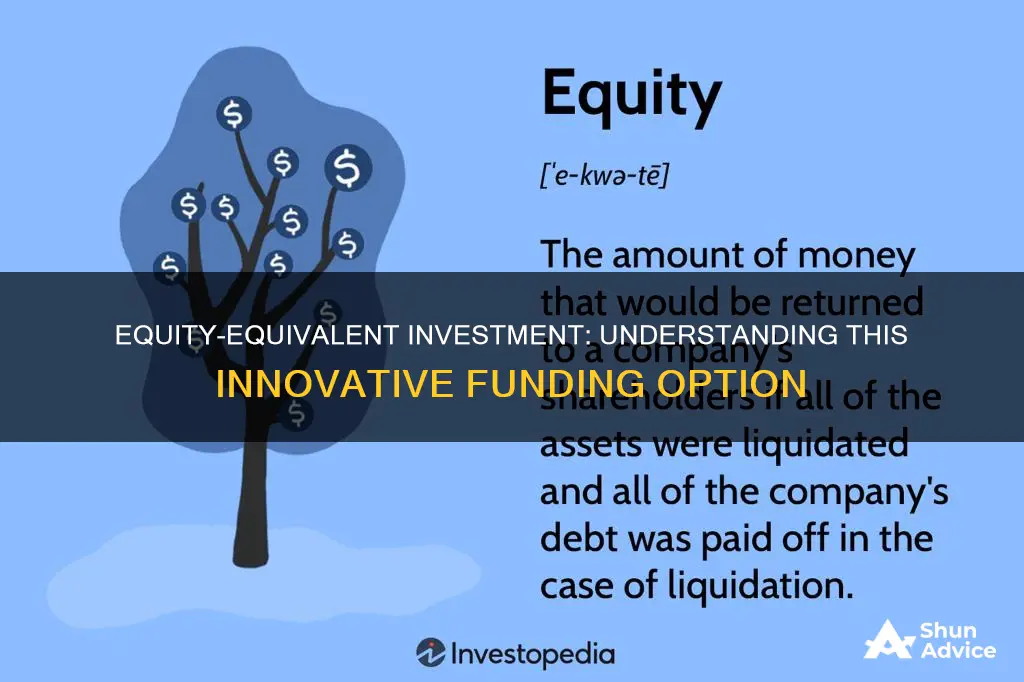
Equity Equivalent Investments (EE) are a flexible way of investing in CDFIs, allowing them to offer more responsive financing products with longer loan terms. They refer to cash provided to a company either by the purchase of common or preferred stock or by the making of loans that are formally subordinated to the indebtedness of the company to the bank. In South Africa, Equity Equivalent Programmes for Multinationals are designed to fulfill the requirements of Broad-Based Black Economic Empowerment (B-BBEE) ownership. These programmes can take the form of a public or private scheme or a combination of both, and they need to be approved by the Minister of Trade and Industry to qualify for ownership points on the scorecard.
Characteristics of Equity Equivalent Investments
| Characteristics | Values |
|---|---|
| Definition | Equity Equivalent Investments ("EQ2s") are a flexible way of investing in CDFIs, allowing them to offer more responsive financing products with longer loan terms than what is usually available on the market. |
| Examples | Subordinate notes payable; Equity Interests; Securities; Loans; Common or preferred stock |
| Requirements | Must be approved by the Minister of Trade and Industry to qualify for ownership points on the scorecard |
| Measurement | The value of EE contributions can be measured against 25% of the value of the Multinational's South African operations or 4% of the total revenue from its South African operations annually over the period of continued measurement |
What You'll Learn

Equity Equivalent (EE) contributions
EE contributions are particularly relevant for multinational companies or entities that have global practices preventing them from complying with the ownership element of certain programmes or regulations, such as the B-BBEE ownership element in South Africa. In such cases, EE contributions serve as an alternative to the traditional sale of shares, allowing these companies to make contributions in lieu of direct equity ownership.
The value of EE contributions for B-BBEE initiatives in South Africa, for example, can be measured against 25% of the value of the multinational company's South African operations or 4% of the total revenue from its South African operations annually over a period of continued measurement. To qualify for ownership points on the B-BBEE scorecard, an EE programme must be approved by the Minister of Trade and Industry.
EE contributions can take various forms, including public or private programmes, schemes, or investments. These contributions are designed to fulfil the requirements of ownership or participation in specific programmes or initiatives. For instance, an EE programme targeting investment or promoting socio-economic advancement within a particular economy could qualify as an EE contribution.
Overall, EE contributions provide a way for companies, particularly multinationals, to demonstrate their commitment to specific economic, social, or regulatory objectives without necessarily acquiring direct equity ownership.
Understanding Investment Portfolios: The Role of Equity
You may want to see also

EE contributions and B-BBEE ownership
Equity Equivalent (EE) contributions are an alternative to the traditional sale of shares to Black South Africans, which some multinational companies are unable to do due to their global practices. These contributions are recognised as fulfilling the objectives of Broad-Based Black Economic Empowerment (B-BBEE) in South Africa.
The Codes of Good Practice require that all entities operating in the South African economy make a contribution towards the objectives of B-BBEE. EE contributions are measured against 25% of the value of a multinational's South African operations or 4% of the total revenue from its South African operations annually over a period of continued measurement.
An EE Programme would require a public and/or private programme/scheme designed to fulfil the requirements of B-BBEE ownership. Such a programme must gain approval from the Minister of Trade and Industry to qualify for ownership points on the B-BBEE scorecard.
The B-BBEE scorecard is made up of five elements: ownership, management control, skills development, enterprise and supplier development, and socio-economic development. The ownership element is one of the most critical, addressing the historic exclusion of Black people from the ownership of assets and businesses in South Africa.
EE Programmes are expected to contribute to objectives such as enterprise creation and development, foreign direct investment, accelerated empowerment of Black rural women and youth, sustainable growth and development, and infrastructure investment.
The process for the approval of an EE Programme includes the following steps:
- Multinational entity obtains in-principle support for application for exemption from the sale of equity from the line Ministry.
- Multinational entity submits an application for exemption from the sale of equity to the Department of Trade, Industry and Competition (dtic).
- Multinational entity must prove that such a sale of equity is against global practice.
- The dtic grants exemption and approves the proposal for an EE Programme.
- Multinational entity submits the EE proposal to the dtic within 60 days of the granting of the exemption.
- The EE proposal is evaluated by the EE Committee.
- The dtic grants pre-approval within two weeks of the evaluation.
- If the proposal is rejected, the dtic notifies the multinational entity and submits the reasons for rejection.
- The dtic evaluation committee makes recommendations to the Minister for final approval.
- Scorecard points for the EE Programme are calculated and awarded to the multinational entity.
Savings, Investments, and the Economy's Vital Balance
You may want to see also

EE contributions and CDFIs
Equity Equivalent (EE) contributions are a flexible way of investing in Community Development Financial Institutions (CDFIs). EE contributions enable CDFIs to offer more responsive financing products with longer loan terms than are otherwise available on the market.
The Community Development Financial Institutions Fund (CDFI Fund) is a US government initiative that aims to generate economic growth and opportunity in some of the country's most distressed communities. The CDFI Fund offers monetary awards and training opportunities to CDFIs, empowering them to grow, achieve organisational sustainability, and drive community revitalisation.
In the 2023 fiscal year, CDFI Program awardees financed more than 126,000 businesses, provided funding for over 76,000 affordable housing units, and originated more than $57 billion in loans and investments. The CDFI Program offers both Financial Assistance and Technical Assistance awards to CDFIs. These awards support and enhance the ability of these organisations to meet the needs of the communities they serve.
Financial Assistance awards are made in the form of loans, grants, equity investments, deposits, and credit union shares, which CDFIs are required to match dollar-for-dollar with non-federal funds. This requirement allows CDFIs to multiply the impact of federal investment to meet the demand for affordable financial products in economically distressed communities.
Savings and Investment: Interplay in a Closed Economy
You may want to see also

Equity Equivalent Programmes for Multinationals
Equity Equivalent (EE) contributions are made in lieu of a direct sale of equity, and they count towards the ownership element of B-BBEE. The value of EE contributions can be measured in two ways: against 25% of the value of the multinational's South African operations or 4% of the total revenue from its South African operations annually over a period of continued measurement.
An EE programme can be a public, private, or a combination of both types of programmes/schemes. It must be designed to fulfil the requirements of B-BBEE ownership and be approved by the Minister of Trade and Industry to qualify for ownership points on the scorecard. The programme and points awarded cannot be part of any other B-BBEE element in the multinational's B-BBEE Scorecard.
The proposal for an EE programme must be developed by a representative entity of the foreign multinational and submitted to the Department of Trade and Industry (dtic). The Equity Equivalent Secretariat is responsible for analysing valuation methodologies and business plans from multinational companies, managing applications for exemptions, assisting with strategy development, handling queries from stakeholders, and providing support to the Equity Equivalent Committee, among other duties.
Understanding Discretionary Investment Management Agreements
You may want to see also

Equity Equivalent Programmes and scorecards
Equity Equivalent Programmes are designed to fulfil the requirements of Broad-Based Black Economic Empowerment (B-BBEE) ownership in South Africa. The B-BBEE Act of 2003 was introduced to address existing racially-based income inequalities and enable the economic participation of citizens classified as Africans, coloureds, or Indians ("black people") who were previously excluded from participating in the South African economy during apartheid.
The Codes of Good Practice, which are part of the B-BBEE legislation, recognise that some foreign entities may be unable to satisfy the ownership requirements, particularly those related to bringing in previously disadvantaged individuals as part-owners. As such, the Codes provide for the recognition of contributions in lieu of a direct sale of equity, known as Equity Equivalent (EE) contributions. These EE contributions count towards the ownership element of B-BBEE for multinationals.
An Equity Equivalent Programme can be a public programme, a private programme, or a combination of both. It must be approved by the Minister of Trade and Industry to qualify for ownership points on the B-BBEE scorecard. The programme and points awarded may not form part of any other B-BBEE element in the Multinational's B-BBEE Scorecard.
A proposal for an EE Programme must be developed by a representative entity of the foreign multinational and submitted to the Department of Trade, Industry, and Competition (dtic). The proposal should demonstrate commercial viability and long-term sustainability, be aligned with the overall objectives of B-BBEE, and include a transfer of accredited business and/or technical skills.
There are several recommended forms that an Equity Equivalent Programme can take:
- Enterprise Creation Programmes: These programmes support enterprise development through the provision of seed or development capital.
- Social Advancement Programmes: These programmes provide training and/or mentoring to designated beneficiary entities or communities.
- Technology Transfer Projects: These projects focus on technology transfer or diffusion within the small, medium, and micro-enterprise sector of the local economy, beyond the foreign entity's core business activities.
- Economic Growth and Employment Creation Programmes: These programmes promote economic growth and job creation through the development of technological innovation outside the foreign entity's core business activities.
- Sustainable Job Creation Initiatives: These initiatives focus on creating or developing the capacity and expertise for beneficiary entities to manufacture or produce goods and/or services that were previously not available in South Africa.
The financial contributions to equity-equivalent programmes are measured against the value of the multinational's South African operations or the total revenue from its South African operations annually over the period of continued measurement.
The Role and Responsibilities of the Equity Equivalent Committee
The Equity Equivalent Committee is responsible for evaluating and negotiating EE proposals against the set criteria, providing recommendations to the Minister on the approval or rejection of an EE Programme, monitoring and evaluating the implementation of EE Programmes, providing strategic direction on B-BBEE, and liaising and disseminating information to other government departments and stakeholders.
The Committee is composed of permanent and ad-hoc members, including representatives from the Broad-Based Black Economic Empowerment Unit, the National Industrial Participation Secretariat Unit, the Industrial Development Corporation, and relevant divisions within the dtic.
Procedure for the Approval of Equity Equivalent Participation
The procedure for a multinational entity to obtain approval for an Equity Equivalent Programme involves the following steps:
- Application for Exemption: The entity obtains in-principle support for the Equity Equivalent Business Plan from the relevant line ministry and submits an application to the dtic for exemption from the sale of equity.
- Submission of the Proposed Contribution Amount: The entity undertakes a financial valuation to determine the EE contributions and submits a Valuation Report to the dtic.
- Evaluation of EE Proposals: Once exemption is granted, the entity submits a detailed business plan for the EE programme, linked to the EE contributions as per the valuation.
- Points under the Scorecard are Granted: After approval by the Minister of Trade and Industry, for the EE Contribution and the EE Programme, a Memorandum of Agreement (MOA) is signed, and points under the ownership element are awarded to the multinational.
- Monitoring of EE Projects: The multinational reports on the progress of the EE Project as per the EE proposal, MOA, and Monitoring and Evaluation Guidelines.
Integrity Metrics: Management's Investment Guide
You may want to see also
Frequently asked questions
Equity-equivalent investments are a flexible way of investing in CDFIs, often enabling them to offer more responsive financing products with longer loan terms.
Equity-equivalent investments provide cash to a company either by purchasing common or preferred stock or by making loans that are formally subordinated to the company's indebtedness to a bank.
Examples of equity-equivalent investments include subordinate notes payable, which are classified as equity-equivalent investments with a rolling term (maturity) feature.
Equity-equivalent investments allow companies to offer more responsive financing products and longer loan terms. They also enable companies to promote socio-economic advancement and development within a specific economy, such as in the case of South Africa's B-BBEE programme.
In the case of South Africa's B-BBEE programme, equity-equivalent contributions count towards the ownership element of the empowerment programme. For a programme to qualify for ownership points on the scorecard, it needs to be approved by the Minister of Trade and Industry.







